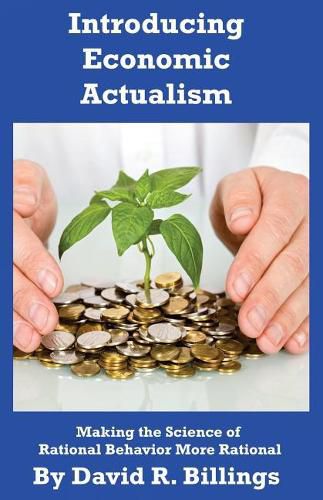Readings Newsletter
Become a Readings Member to make your shopping experience even easier.
Sign in or sign up for free!
You’re not far away from qualifying for FREE standard shipping within Australia
You’ve qualified for FREE standard shipping within Australia
The cart is loading…






Economic actualism is an economic theory which, by making the science of rational behaviour more rational, promises to make our world and our lives happier. If capitalism’s objective is to dominate nature, and socialism aims to redistribute wealth, and communism explores class conflict, then economic actualism has a new thesis: that society can be explained as a confusion of nominal and actual wealth. Our financial records can tell us we are prospering when we are becoming impoverished. Introducing Economic Actualism uses three principles to describe the formation of economic bubbles: uncertainty, certain deviation and feedback. Just as a fire is a chemical reaction that results from the simultaneous presence of fuel oxygen and spark without water an economic bubble results from the simultaneous presence of inversion, ineffectiveness and duress without social feedback. The invisible hand that guides our economy is partly that of a pyromaniac, sparking a match. Introducing Economic Actualism is the first of a series of planned books of which two others have been completed. While money is one form of nominal record that we confuse with actual wealth, other forms of nominal recording also exist. This theory has implications in a broad range of fields including psychology and religion. It is applicable to all societies but has great relevance to twenty first century North America as it struggles with run away nominalism.
$9.00 standard shipping within Australia
FREE standard shipping within Australia for orders over $100.00
Express & International shipping calculated at checkout
Stock availability can be subject to change without notice. We recommend calling the shop or contacting our online team to check availability of low stock items. Please see our Shopping Online page for more details.
Economic actualism is an economic theory which, by making the science of rational behaviour more rational, promises to make our world and our lives happier. If capitalism’s objective is to dominate nature, and socialism aims to redistribute wealth, and communism explores class conflict, then economic actualism has a new thesis: that society can be explained as a confusion of nominal and actual wealth. Our financial records can tell us we are prospering when we are becoming impoverished. Introducing Economic Actualism uses three principles to describe the formation of economic bubbles: uncertainty, certain deviation and feedback. Just as a fire is a chemical reaction that results from the simultaneous presence of fuel oxygen and spark without water an economic bubble results from the simultaneous presence of inversion, ineffectiveness and duress without social feedback. The invisible hand that guides our economy is partly that of a pyromaniac, sparking a match. Introducing Economic Actualism is the first of a series of planned books of which two others have been completed. While money is one form of nominal record that we confuse with actual wealth, other forms of nominal recording also exist. This theory has implications in a broad range of fields including psychology and religion. It is applicable to all societies but has great relevance to twenty first century North America as it struggles with run away nominalism.